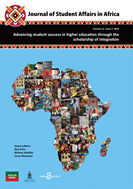Bridging Gaps: Enhancing Holistic Mathematics Support in the Transition from Secondary School to University
DOI:
https://doi.org/10.24085/jsaa.v12i2.5450Keywords:
holistic approach, mathematics support, first-year engineering students, transition from secondary school to university, engineering educationAbstract
The provision of multidimensional holistic mathematics support for students transitioning from secondary school to university level is identified as a challenge currently facing global education systems including in South Africa. Ongoing attempts to select effective mathematics learning support reflect the enduring nature of a problem with multifaceted contributing factors. Despite a wealth of literature there has been little effort to consolidate diverse sources into a comprehensive and useful understanding. This study aims to close this gap by synthesising and integrating these disparate elements into a unified framework. The research employs a comprehensive rapid literature review, meticulously following the PRISMA guidelines. The review concentrates on papers which investigate the impact of specific types of mathematical support, on those conducting analyses of the efficacy of distinct mathematical support approaches, and papers proposing solutions towards improving first-year South African university students’ mathematics performance. To mitigate bias, the Rayyan AI-assisted literature review platform is utilised, ensuring a rigorous and unbiased selection process. This rapid literature review reveals a general hindrance to holistic mathematics learning support, in the form of an absence of a unified framework. We see this deficiency as potentially detrimentally impacting students, and as underscoring the need for a comprehensive approach. The findings suggest that mathematics support can be enhanced by integrating the core elements of a holistic approach, together with acknowledging the interconnectedness and mutual influence of the various elements.
Downloads
Published
Issue
Section
License
Copyright (c) 2024 Alfred Msomi, Ekaterina Rzyankina

This work is licensed under a Creative Commons Attribution-NonCommercial-ShareAlike 4.0 International License.
Authors who publish with this journal agree to the following terms:
Authors retain copyright and grant the journal right of first publication with the work simultaneously licensed under the Creative Commons Attribution Share-alike 4.0 International License that allows others to share the work with an acknowledgement of the work's authorship and initial publication in this journal.
Authors are able to enter into separate, additional contractual arrangements for the non-exclusive distribution of the journal's published version of the work (e.g., post it to an institutional repository or publish it in a book), with an acknowledgement of its initial publication in this journal.
Authors are permitted and encouraged to post their work online (e.g., in institutional repositories or on their website) prior to and during the submission process, as it can lead to productive exchanges, as well as earlier and greater citation of published work (See: The Effect of Open Access).


